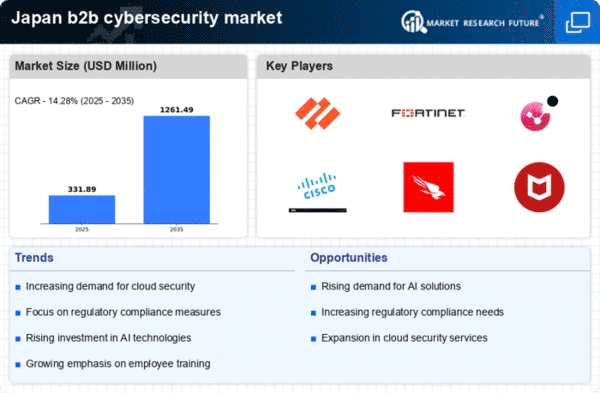Increased Regulatory Scrutiny
The b2b cybersecurity market in Japan is significantly influenced by the increasing regulatory scrutiny surrounding data protection and privacy. With the implementation of stricter regulations, such as the Act on the Protection of Personal Information, businesses are required to enhance their cybersecurity measures to avoid hefty fines and legal repercussions. In 2025, it is anticipated that compliance-related expenditures will account for approximately 30% of total cybersecurity budgets among Japanese firms. This regulatory environment drives organizations to invest in comprehensive cybersecurity solutions, fostering growth in the b2b cybersecurity market. As companies strive to meet compliance standards, the demand for specialized cybersecurity services and technologies is expected to rise.
Rising Cyber Threat Landscape
The b2b cybersecurity market in Japan is experiencing heightened demand due to an increasingly complex cyber threat landscape. Cyberattacks, including ransomware and phishing, have surged, prompting businesses to invest in robust cybersecurity measures. In 2025, it is estimated that cybercrime could cost Japanese businesses over $1 trillion, underscoring the urgency for enhanced security protocols. Organizations are compelled to adopt advanced technologies such as AI and machine learning to detect and mitigate threats in real-time. This evolving threat environment necessitates continuous investment in cybersecurity solutions, driving growth in the b2b cybersecurity market. As companies recognize the potential financial and reputational damage from breaches, the focus on comprehensive cybersecurity strategies becomes paramount.
Digital Transformation Initiatives
As Japanese businesses accelerate their digital transformation initiatives, the b2b cybersecurity market is poised for significant growth. The integration of cloud services, IoT devices, and remote work solutions has expanded the attack surface for cyber threats. In 2025, it is projected that 70% of enterprises in Japan will adopt cloud-based solutions, necessitating enhanced cybersecurity measures to protect sensitive data. This shift towards digitalization compels organizations to reassess their cybersecurity frameworks, leading to increased investments in advanced security technologies. Consequently, the b2b cybersecurity market is likely to benefit from this trend, as companies seek to safeguard their digital assets and maintain compliance with evolving regulations.
Growing Awareness of Cybersecurity Risks
There is a notable increase in awareness regarding cybersecurity risks among Japanese businesses, which is positively impacting the b2b cybersecurity market. As high-profile data breaches make headlines, organizations are becoming more cognizant of the potential threats they face. In 2025, surveys indicate that over 60% of Japanese companies plan to enhance their cybersecurity training programs for employees, recognizing that human error is a significant factor in security breaches. This growing awareness is likely to drive investments in cybersecurity solutions, as businesses seek to educate their workforce and implement preventive measures. Consequently, the b2b cybersecurity market is expected to expand as organizations prioritize security training and awareness initiatives.
Emergence of Advanced Cybersecurity Technologies
The b2b cybersecurity market in Japan is witnessing a surge in the adoption of advanced cybersecurity technologies. Innovations such as artificial intelligence, machine learning, and blockchain are transforming the way organizations approach cybersecurity. In 2025, it is projected that spending on AI-driven cybersecurity solutions will increase by 40%, as businesses seek to leverage these technologies for enhanced threat detection and response capabilities. This trend indicates a shift towards proactive cybersecurity measures, where organizations can anticipate and mitigate threats before they escalate. As the demand for sophisticated cybersecurity solutions grows, the b2b cybersecurity market is likely to experience substantial growth, driven by the need for cutting-edge technologies to combat evolving cyber threats.
















